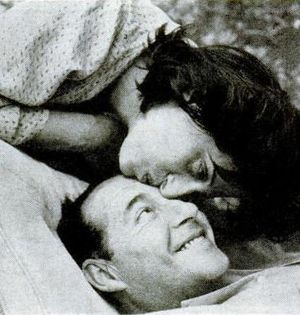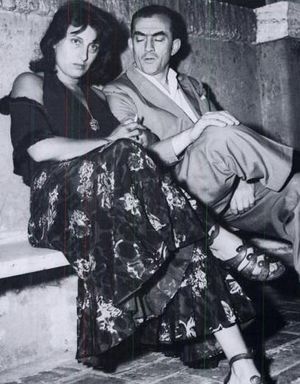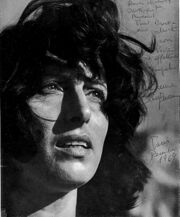آنا مانياني
آنا مانياني | |
|---|---|
Anna Magnani | |
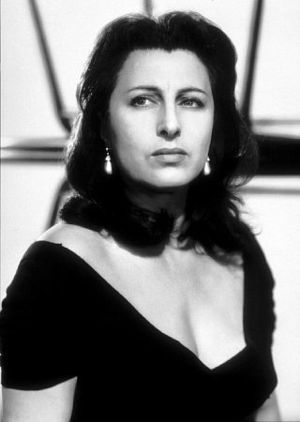 | |
| وُلِدَ | 7 مارس 1908 |
| توفي | 26 سبتمبر 1973 (aged 65) روما، إيطاليا |
| المهنة | ممثلة |
| سنوات النشاط | 1928–1972 |
| الزوج | Goffredo Alessandrini (1935–1950) |
آنّا مانياني Anna Magnani، ممثلة إيطالية، ولدت في الإسكندرية في مصر وتوفيت في روما، وتعدّ من أعظم ممثلات إيطاليا في القرن العشرين. عاشت طفولة حزينة وترعرعت في بيت عمتها وجدتها. تركت الدراسة والتحقت بالمعهد الموسيقي في روما ، ثم أكملت دراستها في أكاديمية الفنون المسرحية Accademia d’arte Drammatica بإدارة سيلفيو داميكو Silvio d’Amico. وبعد التخرج، عملت طويلاً في المسرح مع فرقة داريو نيكوديمي Dario Nicodemi. انفصلت مانياني عن زوجها لترتبط بالممثل ماسيمو تشيروتو M.Ceroto وأنجبت منه ابنها لوقا Luca.
السيرة
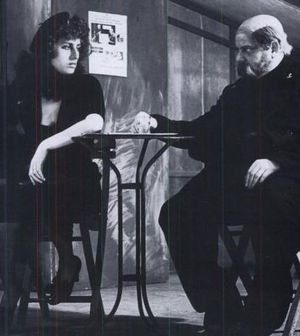
في بداية الأربعينات، قدمت مانياني عروضاً مميزة مع النجم الكبير توتو Totó وغدت السيدة الأولى في العروض المسرحية. وحلقت في فيلم «تيريزا يوم الجمعة» Teresa Venerdi (1941) بإدارة فيتوريو دي سيكا V.De Sica. وفي عام 1943 انتقلت إلى العمل في مسرح المنوعات مع الأخوين ريجي Regi، ولعبت أول دور سينمائي في فيلم «عمياء سورنتو» La Cieca di Sorrento للمخرج نونسيو مالاسوما N.Malasomma.
العمل بالتمثيل
وفي عام 1945 سنحت أمامها الفرصة الكبرى بالعمل مع روبرتو روسيلّيني R.Rossellini في فيلم «روما، مدينة مفتوحة» Roma, Città Aperta وأصبحت هذه التحفة السينمائية إحدى رموز «الواقعية الجديدة» Neorealismo. تألقت مانياني بأدائها في دور المرأة الشعبية «بينا» Pina التي يقتلها النازيون، وفرضت نفسها على النقاد والجمهور معاً، وتلقت جائزة أفضل ممثلة في مهرجان البندقية. وقد أضحـت (صرختها الأخيرة) في هذا الفيلم رمـزاً وأيقونة لشعب مقاوم يرفض الاحتلال، هذه الصرخة أوحت للمخرج السينمائي والشاعر بيير باولو بازوليني P.Paulo Pasolini بنظم واحدة من أجمل قصائده.
في عام 1946، أنجزت مانياني فيلمين بإدارة المخرج ألبرتو A.Lattuada هما «قاطع الطريق» Il Bandito، و«آلام العذراء» Assunta Spina. وفي عام 1947، قامت بالتمثيل في فيلم «صاحبة السعادة أنجلينا» L’Onorevole Angelina مع المخرج لويجي زامبا L.Zampa.
المعجزة (1948)
عادت مانياني للعمل مع روسيلّيني في الجزء الأول من فيلم «الصوت الإنساني» La Voce Umana (1948)، وهو مقتبس من عمل أدبي من مؤلفات جان كوكتو J.Cocteau بعنوان «الحب» Amore. أما الجزء الثاني وهو «الأعجوبة» فكان بإدارة المخرج فلّيني Fellini الذي يمثل فيه دور الراعي أمام الفلاحة البسيطة مانياني.
فازت مانياني في السنوات العشر، التي تلت خمس مرات بجائزة «الشريط الفضي» Nastro d’Argento وهي أرفع جائزة تعطى في إيطاليا. استمرت مانياني في العمل مع مخرجين كبار، وأصبحت الأدوار تكتب لها خصيصاً، وقد أسند إليها فيسكونتي Visconti دور الأم الطموحة في فيلم «رائعة الجمال» Bellissima (1951)، من خلال قصة مؤثرة وحزينة. وأسند إليها المخرج الفرنسي جان رينوار J.Renoir بطولة فيلم «العربة الذهبية» Le Carrossa d’or (1952). ومن أفلام هوليوود «وشم الوردة» The Rose Tattoo (1955)، للمخرج دافيد مان D.Mann المأخوذ عن مسرحية تينيسي وليامز T.Williams الذي حازت فيه آنا مانياني جائزة الأوسكار لأفضل ممثلة. وكانت قد تزوجت في عام 1953 من المخرج جولفريدو أليساندريني G.Alessandrini.
شاركت آنا مانياني في ألمانيا في فيلم «البركان» Vulcano (1958) للمخرج وليام ديترله W.Dieterle. بعد عودتها إلى إيطاليا عملت مع المخرج ريناتو كاستيلاني R.Castellani في فيلم «في مدينة الجحيم» Nella Città L’ inferno، ومع المخرج ماريو كاميريني M.Camerini في فيلم «الراهبة الأخت ليتيسيا» Suor Letizia (1958). دعتها هوليوود من جديد للعمل مع المخرج الأمريكي جورج كوكر G.Cukor في فيلم «الريح المتوحشة» Wild is the Wind، ثم مع المخرج سيدني لومِت S.Lumet في فيلم «جلد الأفعى» The Leather of the Serpent (1959). وتتألق من جديد في إيطاليا مع المخرج بازوليني في الفيلم الخالد «ماما روما» Mamma Roma (1962).
بعد رحلة غنية في السينما حنَّت مانياني للمسرح عندما دعاها المخرج فرانكو زيفيرلي F.Zeffirelli للعمل في مسرحية «الذئبة» La Lupa للكاتب الصقلي جوفاني فيرجا G.Verga. وفي عام 1968 عادت إلى السينما لتعمل مع المخرج والمنتج الأمريكي ستانلي كريمر S.Kramer في فيلـم «سر سانتا فيتوريا» The Secret of Santa Vittoria.
في عام 1971 قدّمت مانياني للشاشة الصغيرة ثلاثية تلفزيونية بعنـوان ثلاث نسـاء: «المغنية 1943» La Sciantosa 1943، و«لقاء» Un Incontro، و«السيارة» L’Automobile. وكان آخر ظهور لها على الشاشة عام 1972، مع فلّيني في فيلم «روما» Roma تظهر فيه للحظات أمام عتبة بيتها.
تعدّ آنا مانياني ممثّلة من طراز رفيع، فقد كانت تتمتع بشخصية قوية وعذبة، ولها مزاج حاد يدهش المتلقي بعفويته وعنفوانه الدرامي. وقد جسدت على الشاشة وعلى المسرح شخصيات إنسانية لا تمحى من الذاكرة، ولعبت أدواراً ذات طبيعة متناقضة ومعقدة، واستطاعت بحق التعبير عن آلام جيل بأكمله.
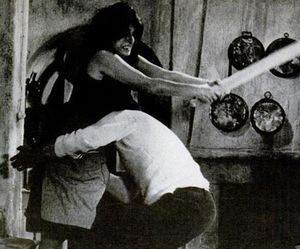
الوفاة
أحدث موتها جرحاً عميقاً ولاسيما للشعب الإيطالي، كما قام بتشييع جثمانها الملايين يتقدمهم رؤساء ووزراء وبرلمانيون وفنانون من جميع أنحاء العالم...[2]
الأفلام والجوائز
| Year | Title | Role | Notes |
|---|---|---|---|
| 1928 | Scampolo | ||
| 1934 | La Cieca di Sorrento | Anna, la sua amante | |
| 1934 | Tempo massimo | Emilia | |
| 1935 | Quei due | ||
| 1936 | Cavalleria | Fanny | |
| 1936 | Trenta secondi d'amore | ||
| 1938 | La Principessa Tarakanova | Marietta, la cameriera | |
| 1940 | Una Lampada alla finestra | Ivana, l'amante di Max | |
| 1941 | Teresa Venerdì | Maddalena Tentini/Loretta Prima | |
| 1941 | La Fuggitiva | Wanda Reni | |
| 1942 | La Fortuna viene dal cielo | Zizì | |
| 1942 | Finalmente soli | Ninetta alias "Lulù" | |
| 1943 | The Last Wagon | Mary Dunchetti, la canzonettista | |
| 1943 | Gli Assi della risata | segment "Il mio pallone" | |
| 1943 | Campo de' fiori | Elide | |
| 1943 | La Vita è bella | Virginia | |
| 1943 | L'Avventura di Annabella | La mondana | |
| 1944 | Il Fiore sotto gli occhi | Maria Comasco, l'attrice | |
| 1945 | Abbasso la miseria! | Nannina Straselli | |
| 1945 | Rome, Open City | Pina |
|
| 1945 | Quartetto pazzo | Elena | |
| 1946 | Abbasso la ricchezza! | Gioconda Perfetti | |
| 1946 | The Bandit | Lidia | |
| 1946 | Avanti a lui tremava tutta Roma | Ada | |
| 1946 | Lo Sconosciuto di San Marino | Liana, la prostituta | |
| 1946 | Un Uomo ritorna | Adele | |
| 1947 | L'onorevole Angelina | Angelina Bianchi | |
| 1948 | Assunta Spina | Assunta Spina | |
| 1948 | L'Amore | The Woman*/Nanni** |
|
| 1948 | Molti sogni per le strade | Linda | |
| 1950 | Volcano | Maddalena Natoli | |
| 1951 | Bellissima | Maddalena Cecconi | Nastro d'Argento Best Actress |
| 1952 | Camicie rosse | Anita Garibaldi | |
| 1953 | The Golden Coach | Camilla | |
| 1955 | The Rose Tattoo | Serafina Delle Rose | |
| 1955 | Carosello del varietà | ||
| 1957 | Wild Is the Wind | Gioia | |
| 1957 | Suor Letizia | Sister Letizia | |
| 1957 | Nella città l'inferno | Egle |
|
| 1959 | The Fugitive Kind | Lady Torrance | |
| 1960 | Risate di gioia | Gioia Fabbricott | |
| 1962 | Mamma Roma | Mamma Roma | |
| 1969 | The Secret of Santa Vittoria | Rosa | Nominated — Golden Globe Award for Best Actress – Motion Picture Musical or Comedy |
| 1971 | 1870 | Tersa Parenti | Globo d'oro Best Actress |
| 1972 | Roma | Herself |
أفلام إيطالية أخرى
Magnani continued to work in Italian movies. ...And the Wild Wild Women (Nella Città L'Inferno, 1958) paired her as an unrepentant streetwalker with Giulietta Masina, Federico Fellini's wife and star, in a women-in-prison film.
ماما روما (1962)
In Pier Paolo Pasolini's Mamma Roma (1962), Magnani is both the mother and the whore, playing an irrepressible prostitute determined to give her teenaged son a respectable middle-class life. Mamma Roma, while one of Magnani's critically acclaimed films, was not released in the United States until 1995, deemed too controversial 33 years earlier. By now, she was frustrated at being typecast in the roles of poor women. Magnani in 1963 commented, "I’m bored stiff with these everlasting parts as a hysterical, loud, working-class woman".[4]
سر سانتا ڤيتوريا (1969)
In one of her last film roles, The Secret of Santa Vittoria (1969), she co-starred with Anthony Quinn, with whom she had appeared with a decade before in Wild is the Wind. They played husband and wife in what Life called "perhaps the most memorable fight since Jimmy Cagney smashed Mae Clarke in the face with a half a grapefruit."
In real life as well as in their reel life, Magnani and Quinn feuded in private outside view of the cameras, and their animosity spilled over into their scenes:
"By the time the movie makers were ready to shoot the fight scene, the stars were ready, too. Magnani not only went for Quinn with the pasta and with a rolling pin, but [also] with her foot; she kicked so hard she broke a bone in her right foot. She also bit him in the neck. 'That's not in the script', Quinn protested. Magnani snarled, 'I'm supposed to win this fight, remember?"[5]
فيلم فليني روما (1972)
She later played herself (within a dramatic context) in Federico Fellini's Roma (1972). Towards the end of her career, Magnani was quoted as having said, "The day has gone when I deluded myself that making movies was art. Movies today are made up of…intellectuals who always make out that they’re teaching something".[بحاجة لمصدر]
أسلوب التمثيل
According to film critic Robin Wood, Magnani's "persona as a great actress is built, not on transformation, but on emotional authenticity... [she] doesn't portray characters but expresses 'genuine' emotions."[6] Her style does not display the more obvious attributes of the female star, with neither her face or physical makeup being considered "beautiful", wrote Wood. However, she possesses a "remarkably expressive face," and for American audiences, at least, she represents "what Hollywood had consistently failed to produce: 'reality'". She was the atypical star, the "nonglamorous human being", as her genuine style of acting became a "rejection of glamour".[6]
Her most distinguished work in Hollywood is in Wild Is the Wind, according to Wood. Directed by George Cukor, "the American cinema's greatest director of actresses," he was able to draw out the "individual essence" of Magnani's "sensitive and inward performance."[6]
الحياة الشخصية
During Benito Mussolini's rule, Magnani was known to make jokes about the Italian Fascist Party.[7]
She married Goffredo Alessandrini, her first film director, in 1935, two years after he discovered her on stage. After they married, she retired from full-time acting to "devote herself exclusively to her husband", although she continued to play smaller film parts.[8] They separated in 1942.
Magnani had a love affair with actor Massimo Serato, by whom she had her only child, a son named Luca,[7] who was born on 29 October 1942 in Rome, after her separation from Alessandrini. At the age of 18 months, Luca contracted polio and subsequently lost the use of his legs due to paralysis. As a result, Magnani spent most of her early earnings for specialists and hospitals. After once seeing a legless war veteran drag himself along the sidewalk, she said, "I realize now that it's worse when they grow up", and resolved to earn enough to "shield him forever from want".[8]
In 1945, she fell in love with director Roberto Rossellini while working on Roma, Città Aperta (Rome, Open City). "I thought at last I had found the ideal man... [He] had lost a son of his own and I felt we understood each other. Above all, we had the same artistic conceptions." Rossellini could be violent, volatile and possessive, however, and they would argue about films or out of jealousy. "In fits of rage they threw crockery at each other."[8] As artists, though, they complemented each other well while working on neorealist films. The two split up when Rossellini had an affair with Ingrid Bergman, whom he married after she conceived a child.
Magnani was mystically inclined and consulted astrologers, as well as believing in numerology. She also claimed to be clairvoyant.[8] She ate and drank very little and could subsist for long periods on nothing more than black coffee and cigarettes. However, these habits often affected her sleep: "My nights are appalling," she said. "I wake up in a state of nerves and it takes me hours to get back in touch with reality."[8]
المصادر
- ^ Hochkofler, Matilde. Anna Magnani, Gremese Editore (2001)
- ^ إيليا قجميني. "مانياني (آنا ـ)(1908ـ 1973)". الموسوعة العربية.
- ^ "Berlinale 1958: Prize Winners". berlinale.de. Retrieved 2010-01-05.
- ^ "Biography of Anna Magnani" Archived سبتمبر 23, 2009 at the Wayback Machine Italiamai.com
- ^ Hamblin, Dora Jane. Life magazine, 6 December 1968
- ^ أ ب ت خطأ استشهاد: وسم
<ref>غير صحيح؛ لا نص تم توفيره للمراجع المسماةActors - ^ أ ب خطأ استشهاد: وسم
<ref>غير صحيح؛ لا نص تم توفيره للمراجع المسماةZeffirelli - ^ أ ب ت ث ج خطأ استشهاد: وسم
<ref>غير صحيح؛ لا نص تم توفيره للمراجع المسماةLife50
فيديو كليب
- various movie clips
- scene from Rome, Open City
- scene from The Fugitive Kind with Marlon Brando
- "A Tribute slide show"
- trailer for Wild is the Wind (1957)
- scene from Wild is the Wind with Anthony Quinn
- scene from Correva l'anno di grazia' with Marcello Mastroianni
وصلات خارجية
- Articles with unsourced statements from March 2011
- Pages with empty portal template
- صفحات بها قالب:Ill-WD2 دون وصلات لغات
- مواليد 1908
- وفيات 1973
- 20th-century Italian actresses
- Accademia Nazionale di Arte Drammatica Silvio D'Amico alumni
- ممثلات من روما
- Best Actress Academy Award winners
- Best Drama Actress Golden Globe (film) winners
- Best Foreign Actress BAFTA Award winners
- David di Donatello winners
- Deaths from cancer in Lazio
- Deaths from pancreatic cancer in Italy
- Italian film actresses
- Nastro d'Argento winners
- People of Calabrian descent
- People of Marchesan descent
- People of Romagnol descent
- Silver Bear for Best Actress winners
- Volpi Cup for Best Actress winners
- فائزة بجائزة أفضل ممثلة في بجائزة الاوسكار
- فائزة بجائزةأفضل ممثلة دراما غولدن غلوب (فيلم)
- وفيات ناجمة عن السرطان في ايطاليا
- وفيات ناجمة عن سرطان البنكرياس
- ممثلون أفلام إيطاليون
